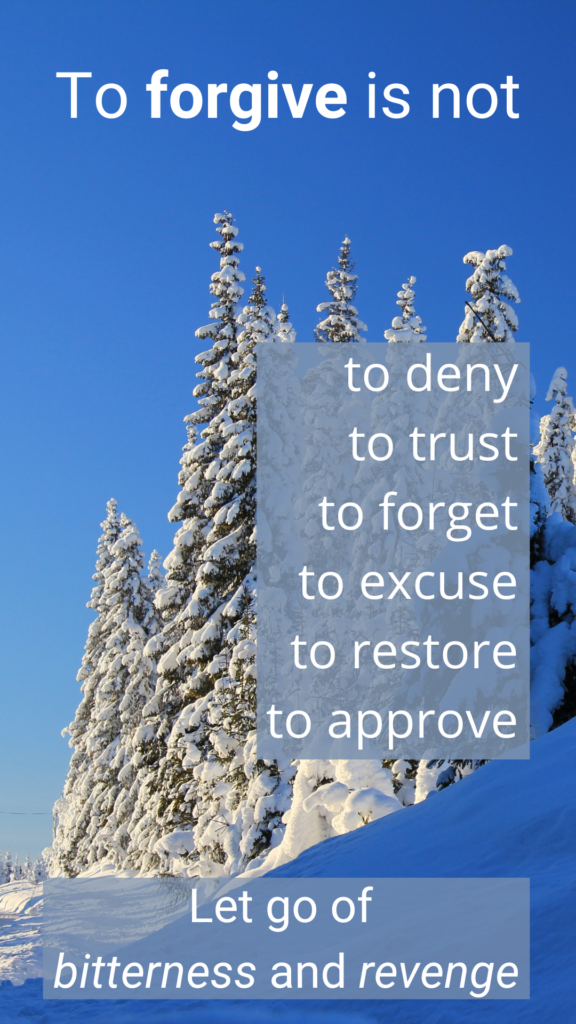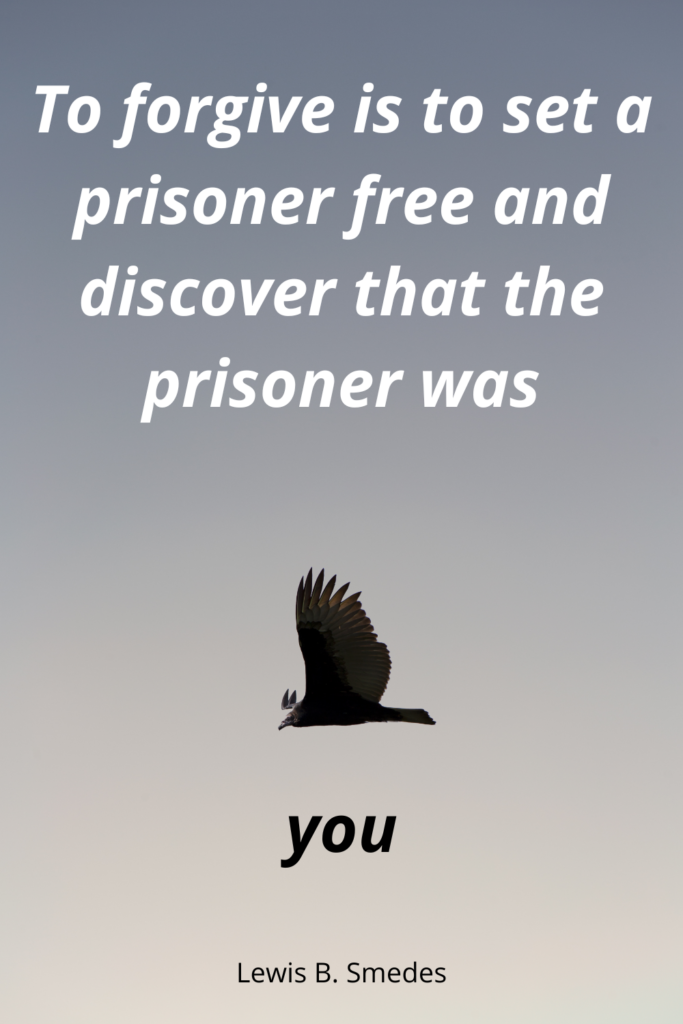Life isn’t always smooth sailing. Whether it’s a friend’s betrayal, a family member’s harsh words, or a colleague’s undermining actions – we all face situations that test our capacity to forgive. However, learning how to forgive can make life a lot easier.
The Science Behind Forgiveness
Research (1) reveals compelling evidence for the healing power of forgiveness:
- Lower rates of depression and anxiety
- Reduced stress levels and PTSD symptoms
- Improved overall mental well-being
What is forgiveness?
In research on forgiveness, forgiveness is defined as renouncing or letting go of bitterness and thoughts of revenge.
This sounds simple but can be challenging for many people. Some find it easier to forgive than others, and a lot is about personality and the value and importance we put on forgiveness.
Studies show that the more selfless and empathetic one is, the greater the probability of being able to forgive. Conversely, the more self-absorbed and apathetic we are, the less likely we are to be able to forgive another human being
Do you struggle to forgive, or do you find it easy? Take this test to see how forgiving you are as a person.
"To err is human, to forgive, Divine" – Alexander Pope
Alexander Pope’s words remind us that while mistakes are part of our nature, forgiveness elevates us beyond our basic instincts.
Common Misconceptions About Forgiveness
What does it mean to forgive? Many people have the idea that forgiveness involves a whole series of things that are not really part of forgiveness.
- It doesn’t mean condoning the action
- It’s not about forgetting what happened
- It doesn’t require reconciliation
- It’s not a transaction (“I’ll forgive if you…”)
Some types of wrongs are so serious that the relationship cannot be restored even if you forgive the person. Reconciliation is an interpersonal process where you talk to the other person about what happened, exchange stories, express pain, listen for remorse and begin to restore trust. It is a much more complicated process that includes but moves beyond forgiveness.
Forgiveness takes one person, reconciliation takes two.

Understanding Those Who Hurt Us: A Deeper Look
People typically hurt others through four main channels:
- Intentional actions: The most challenging to forgive, like premeditated betrayal
- Ignorance: Like a child breaking something valuable without understanding its worth
- Thoughtlessness: Such as a friend sharing your secret without considering the consequences
- Insecurity: For example, a colleague undermining your work due to their own fears
The Jesus Perspective: A Lesson in Radical Forgiveness
The biblical account of Jesus saying “Forgive them, for they know not what they do” while being crucified offers a powerful lesson in perspective-taking. This example shows how:
- Understanding context can shift our perspective
- Even severe wrongs can be viewed through a lens of compassion
- Personal pain doesn’t have to dictate our response
By viewing the person who wrongs us from a broader perspective, we can better understand why they may have hurt us. People can cause harm out of ignorance, while those who hurt us intentionally often have their own struggles. Frequently, their negative actions are simply expressions of the difficulties they face in their lives.
“Clothe yourselves with compassion, kindness, humility, gentleness and patience. Bear with each other and forgive one another if any of you has a grievance against someone” – Apostle Paul
Read also: How Jesus faced stress
Learning How To Forgive Others
Tyler VanderWeele is a leading researcher in forgiveness, serving as a Professor of Epidemiology at Harvard T.H. Chan School of Public Health. He views forgiveness as a two-stage process that involves both an active commitment to fostering positive feelings towards the offender and emotional release from resentment, ultimately promoting healing and personal growth.
1. Decisional Forgiveness
- Making a conscious choice to let go of ill will toward the offender
- Deciding to no longer wish harm upon the other person
- Generally easier and quicker to achieve than emotional forgiveness
2. Emotional Forgiveness
- Moving away from negative feelings toward the person
- Choosing not to dwell on the wrongdoing
- More challenging and time-consuming
- May experience recurring negative emotions when triggered by memories
Practicing Forgiveness in Daily Life
Small incidents provide excellent opportunities for practicing forgiveness:
- Use minor conflicts (like traffic incidents) as training grounds
- Observe the offense objectively
- Recognize that most offenses aren’t personal
- Practice immediate forgiveness to prevent negative emotions from taking root
The REACH Model for Forgiveness
Tyler VanderWeele has developed the REACH model (2), which has helped many individuals learning how to forgive, leading to significant improvements in mental health and overall well-being.
R – Recall
- Think through the wrongdoing objectively
- Visualize the situation and resulting emotions
- Maintain a balanced perspective
E – Empathize
- Try to understand the other person’s perspective
- Consider their potential struggles (anxiety, fear, personal issues)
- Remember: Understanding doesn’t justify the wrong
A – Altruistic gift
- Reflect on times when you needed forgiveness
- Remember how it felt to be forgiven
- View forgiveness as a gift you can give to others
C – Commit
- Make a formal commitment to forgive
- Write down your decision
- Share your commitment with a trusted friend
H – Hold
- Maintain your commitment to forgiveness
- Address recurring negative thoughts
- Remember your decision to forgive when triggered
Key Insights from Dr. Vanderweele
“Forgiveness does not mean erasing memories, but changing our reaction to them”
“Forgiving a person who has wronged you is never easy, but dwelling on those events and reliving them over and over can fill your mind with negative thoughts and suppressed anger”
“Yet, when you learn to forgive you are no longer trapped by the past actions of others and can finally feel free.”
Bitterness
The opposite of forgiveness is to go around being bitter and seeking revenge. It’s a bit like taking poison and hoping the enemy dies. This is not how it works on the battlefield or in life. The person who wronged us may have left the “war” scene and I’m left with bitterness and a bad story that goes on auto-play . This is harmful to my health and is worse for me than for the person who wronged me. This is how bitterness binds us to the past and we are unable to move forward in life, even if we would like to move forward.

Forgiveness heals the wounds
Forgiveness may be compared to wound healing. We all get wounds on body and mind during life. The world is full of injustice and suffering, and it is no coincidence that the archetype in Western civilization was a person unjustly tortured and crucified. The worst can happen the best. Such is the world. That’s how it is to be human. The question is: How should we deal with it?

The wounds on body and mind tend to heal if the wound is treated well. For wounds received in the mind forgiveness can aid in wound healing. However, it is not a miracle cure. Even if we forgive another person, we can still end up with scars. We may have to carry the consequences of bad encounters with us further in life. However, there is a big difference between walking with open wounds and walking with scars.
Your Journey to Forgiveness Starts Now
Remember, forgiveness is a journey. Like physical healing, emotional healing through forgiveness takes time, patience, and often professional support. The question isn’t whether you can forgive, but rather: Are you ready to take the first step toward your own healing?
Share your forgiveness journey in the comments below, or reach out if you need support in your healing process.
Want to Learn More?
- Explore our article on “How Jesus Faced Stress” to understand more about handling life’s challenges with grace
- Read “11 Ways To Calm Amygdala” to learn natural ways to calm your mind in stressful situations






